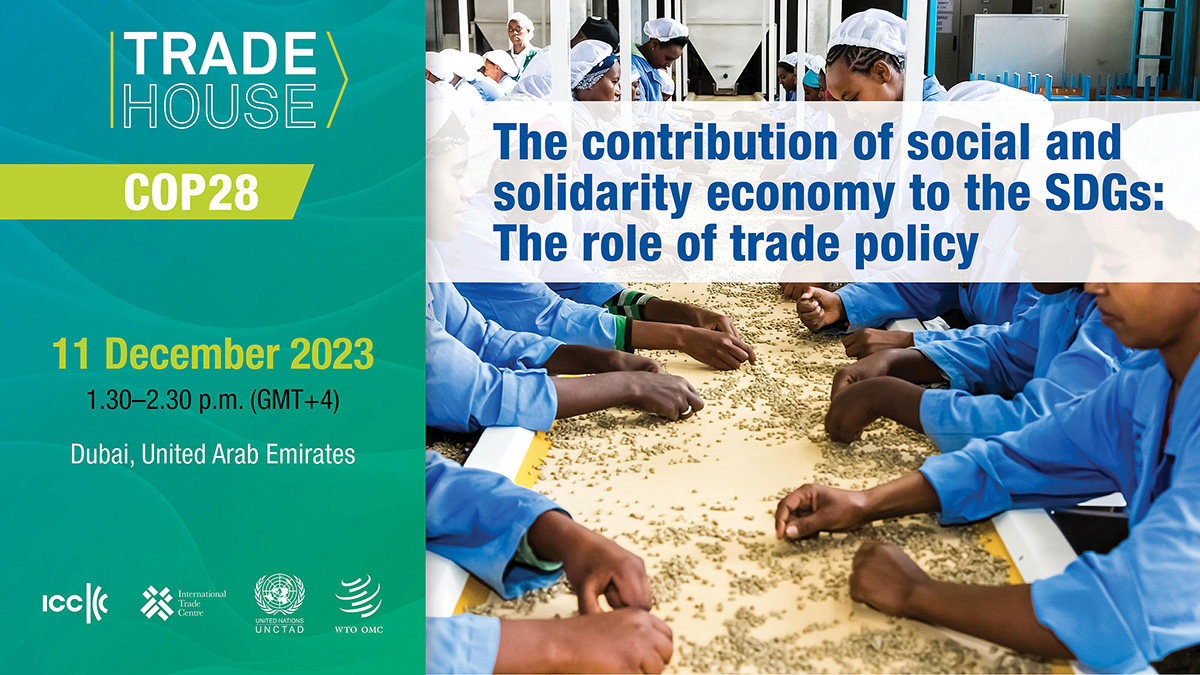There has been substantial focus over recent years on the increasing importance of Social and Solidarity Economy (SSE) and on its role in achieving the three dimensions of sustainable development. This session will take the form of a panel discussion and explore how trade policy can support SSE entities (depending on countries could include cooperatives, associations, mutual societies, foundations, social enterprises, self-help groups and other entities operating in accordance with the values and principles of the SSE) so that they can further contribute to the sustainable development goals (SDGs).
By operating in almost all economic sectors and by integrating social, economic and environmental dimensions, SSE enterprises can contribute to all 17 SDGs as the UN inter-agency Task force on SSE demonstrated in their position paper on the topic. They are by default redistributive and inclusive though their actual contribution to any of the SDGs will necessarily depend on a series of factors, such as their specific characteristics as well as the socio-economic and environmental context in which they operate. More importantly, however, it will depend on the existence of national policies that actively support and enhance the SSE as a New Economic model for sustainable economic and social development.
An increasing number of governments are thinking of SSE as a promising means for achieving the SDGs. In April 2023, the UN General Assembly adopted a Resolution encouraging Member States to promote and implement such national policies, as well as for the relevant UN entities to include SSE in their programming precisely to ensure that SSE entities can contribute its full potential. In this context, UNCTAD is exploring how trade and trade policies can play a role in supporting SSE entities throughout the value chains, and governments have a diverse set of policies they can choose from. These may include providing fiscal incentives, facilitating access to public funding, including from multilateral Development Banks as requested by the Resolution, and integrating SSE considerations in their public procurement systems.
At this event, UNCTAD will bring together SSE actors, researchers, and relevant entities of the UN development system to initiate a dialogue on how to harness trade policy to ensure that SSEs can fully contribute to the sustainable development agenda.
This event will be live streamed
Programme
Moderator:
- Ms. Claudia Contreras, Economic Affairs Officer, Trade, Environment, Climate Change, and Sustainable Development Division on International Trade and Commodities, UNCTAD
Setting the scene:
- Ms, Chantal Line Carpentier, Head, Trade, Environment, Climate Change, and Sustainable Development, Division on International Trade and Commodities, UNCTAD
Speakers:
- Ms. Fabíola Motta, General Manager, Organization of Brazilian Cooperatives (OCB)
- Mr. Dhanush Dinesh, Chief Climate Catalyst, Clim-Eat
- Ms. Cintia Kulzer, Assistant Professor, Department of Innovation, Technology and Entrepreneurship, United Arabs Emirates University
Dr. Claudia Contreras joined UNCTAD in 2013.
Since 2020, she is an Economic Affairs Officer at the Trade, Environment and Sustainable Development Branch. Her work is focused on the interlinkages between climate change, environment, and trade and development.
Formerly, Claudia was a member of the Secretariat of the United Nations Commission on Science and Technology for Development (CSTD), and worked for the Chilean government on science, technology, and innovation policy.
Claudia holds a BSc in Economics from the University of Chile and graduated with an MSc in Management Research and a PhD in Development Studies from the University of Oxford.
Chantal Line Carpentier joined UN Trade and Development (UNCTAD)'s Division on International Trade and Commodities (DITC) in 2014, after serving as Chief, UNCTAD New York Office of the Secretary-General. She brings to the Branch over 25 years of work experience in international trade, and environmental and agro-economics.
Prior to working with UNCTAD, she supported the Commission on Sustainable Development and served as Major Groups (of non-State actors) coordinator for the UN Rio+20 Conference and the SDGs negotiations at the United Nations Department of Economic and Social Affairs (UNDESA). She also supported the sustainable consumption and production and sustainable agriculture negotiations.
As Head of the North American Free Trade Agreement Commission for Environmental Cooperations, she lead work on the nexus of environment, economy, and trade. She also served as Agro-environmental Policy Analyst for Winrock International, and post-Doctoral fellow/Brazil office manager for the International Food Policy Research Institute.
She has an extensive list of publications on sustainable agriculture, trade and environment, sustainable consumption and production, financing for sustainable development, stakeholder engagement, global value chains, micro, small and medium enterprises, and economic empowerment of women.
She obtained a PhD. in Agro-Environmental Economics from Virginia Technology and MSc. and BSc. from McGill University.
Fabíola da Silva Nader Motta is the General Manager of the Organization of Brazilian Cooperatives.
She is a political scientist with a strong background in advocacy, government, and institutional relations. She has been engaged in promoting cooperatives since 2009.
Fabíola was educated at the Ohio University and the University of Brasília.
Dr Cintia Külzer-Sacilotto is an Assistant Professor of Innovation, Technology, and Entrepreneurship at the United Arab Emirates University (UAEU).
Prior to joining UAEU, she was a Senior Research Fellow at the Lee Kong Chian School of Business, Singapore Management University, and a Research Fellow at the Technology and Management Centre for Development, University of Oxford. Her research interests include sustainable entrepreneurship, green innovation, R&D management, business networks, and industrial clusters.
Cintia has co-authored several books and case studies on entrepreneurship and innovation and has published papers in leading peer-reviewed journals. She has conducted research and consultancies for both private and public sectors, as well as international organizations such as the World Bank and the World Economic Forum.
Cintia holds a DPhil in International Development and an MSc in Economics for Development from the University of Oxford, as well as a BSc and MPhil in Economics from the University of Chile.
Dhanush Dinesh, is a fearless visionary determined to shake up our food systems and take on climate change. He refuses to settle for the status quo, which is why he’s assembled a top-notch team at Clim-Eat. Together, they’re on a mission to disrupt the industry, challenge norms, and create a more sustainable future for all.
Prior to founding Clim-Eat, Dhanush worked as Head of Partnerships and treach of CGIAR Research Program on Climate Change, Agriculture and Food Security (CCAFS) to scale up Climate-Smart Agriculture. He is a Trustee of Plan Vivo Foundation and a Visiting Researcher at the University of Leeds. His previous work experience includes roles within the private sector, NGOs, and the UN system, in China, India, Thailand, and the UK. He has worked on a range of issues including forestry, environmental policy, climate change adaptation, and advocacy, at the national, regional, and global levels.
Dhanush has an interdisciplinary academic background, combining an MBA from PSG Institute of Management and an MSc in Carbon management from the University of Edinburgh and has a PhD in Environmental Governance from the Universiteit Utrecht.






